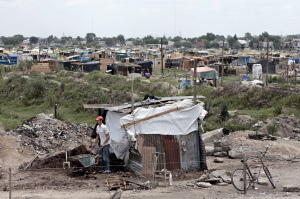Recently a friend of mine asked me my opinion on whether or not donating aid to Africa is actually helpful for Africans. He is involved in a church project that donates supplies to Swaziland, he said, but he didn’t know if his help was doing any good and he figured he would ask around for perspectives. I told him that I had no idea, of course, exactly what the impact was of donating goods to Swaziland, but I did know that Swaziland is ruled by a corrupt King who suppresses democratic rights, owns a hugely disproportionate share of his country’s wealth and, for what it’s worth, occasionally marries teenage girls against the wishes of their parents.
If you want to help Swaziland, I argued, the best way might be to pressure Coca Cola, the largest multi-national invested in the country, to pressure King Mswati to open up the government. Until that happens, there is little hope for economic reforms that will benefit the population as a whole and that would negate the need for donations from people living ten thousand miles away.
My friend said he understood that, but there was a problem. “I want to help,” he said “and that’s not really the way I envision helping. If I’m completely honest with myself, I envision flying into the jungle on a helicopter and saving people.”
While my friend deserves credit for being honest about this, his admission that this urge is potentially self-serving is entirely accurate. He’s also not alone. From Kony 2012 to “Save the Children” to
the adoption craze rising and then crashing and burning in country after country, it is evident that many in the West see their role vis a vis Africans as one of spiritual, physical, and societal salvation. For those in the West wanting to help Africans living in poverty, understanding this dynamic and its implications has to be the first step.
To be clear, wanting to help people is obviously a good thing, and people who want to help should be commended, not condemned. The old saying about the road to hell being paved with good intentions was clearly not coined by somebody familiar with Africa’s post-colonial history; Africa’s road to poverty and conflict has been paved by people with decidedly bad intentions, from Joseph Kony to CIA operatives, from the executives at Shell Oil to the architects of Hutu Power.
But good intentions are not enough. Donated goods can undercut local economies, enrich warlords, and even exacerbate the very problems such donations are intended to solve. On a macro-level, millions of dollars of aid from western countries to African nations doesn’t seem to have demonstrably improved the lives of Africa’s people. All of which is very frustrating to the person in the West who just wants to help.
So how can Westerners help?
Answering that question begins by asking a different question: why do some people in Africa need help in the first place?
To the World Bank, and other major practitioners of “development,” Africans need help because they are lacking technical expertise and resources. In Lesotho, for instance, anthropologist James Ferguson described how the World Bank undertook an enormous project aimed at connecting a rural area to the rest of the country in an effort to improve local herders’ ability to sell their livestock at the market. Clearly, if only these Africans knew how to better leverage their resources and if only they had the money to build a road, their lives would dramatically improve!
Well, as it turns out, the men of the area didn’t want to sell their livestock because the disposable income would then be turned over to their wives while the men were away working in South Africa as seasonal laborers. They very much preferred to use the livestock to barter within their own community. As for the road, the major change it seems to have accomplished is the extension of state power over an area that otherwise had been spared the day-to-day manifestations of the machinations of a corrupt party apparatus running the country.
This is what happens when you assume that people are poor because they are stupid, ignorant, or lacking, say, the right farming implement. “Development,” as Ferguson argues, consistently seems to perpetuate itself in a world in which political explanations for poverty are ignored and replaced with “technical” ones. People are poor, in this logic, because they lack the right farming equipment, not because they lack the ability to influence how their government distributes the right farming equipment. And it is highly unpopular to question this logic. After all, in the words of Brazilian Archbishop Helder Camara, “when I give food to the poor, they call me a saint. When I ask why the poor have no food, they call me a communist.”
The same goes for disaster relief, which can save lives, but which never seems to be accompanied by the question of why Africans are perpetually faced with famine and starvation and thus in need of help, except occasionally by the racist, ignorant segment of the population that demands to know why we in the West are wasting our money on “those people.” One major reason for famines in Africa is IMF policy; loans are often attached to conditions that include the reduction or elimination of government intervention in the economy, often with
disastrous results for food security.
The hypocrisy of this is stunning: US agribusiness is heavily subsidized by the American government, but if Malawi wants to pay its people to grow food, the IMF will punish it by demanding harsh repayment on debts that were mostly incurred when institutions like the IMF loaned money knowingly to dictators who spent the funds on alcohol and Parisian shopping trips. In multiple African countries, the IMF has demanded an increase in exports, meaning farmers are told to grow cash crops for sale in the West rather than staple foods for sale domestically. So, much like during the potato famine in Ireland, when food was actually leaving Ireland and being shipped to England even as people in Ireland starved to death, famine in Africa is usually concurrent with food being shipped from the starving country to countries where people are largely not starving. It’s just that the food is too expensive for the starving people to buy.
So you’re sitting at home, watching news clips of people starving in Africa (assuming there isn’t
something more important going on in the news that day to push a famine off the newscast). You want to help. What can you do? My advice is to follow these rules:
1.
First do no harm. Many types of aid are helpful (more on that later), but many types are not. Donating goods can often undercut local businesses and economies and put people out of work. Imagine if aliens dropped five million pizzas on Oakland tomorrow. How would local pizza store owners and employees feel about that? Giving to organizations that are involved in political situations is also very dangerous unless you trust that organization to properly understand the context in which it is working. Invisible Children, producers of the “Kony 2012” video, is a perfect example of this. In their (obviously accurate) push to denounce Joseph Kony, they have essentially promoted the Ugandan government and the Sudan People’s Liberation Army as “
good guys,”
which is not so obviously accurate. If you don’t want your donated funds to go to warlords or to put people out of work, do your homework first.
2.
Change your government. There are five concrete things the United States government can do right now to dramatically change the lives of millions of Africans. Stop supporting dictators. Forgive odious debts. Change farm policy. Demilitarize on the continent. Support renewable energy to prevent climate change. Nothing we as individuals can do compares to the impact of those five actions, and it’s not even close. We have a democracy in this country, albeit a flawed one, and even if you don’t have your own Superpac, you can still lobby your government to make change. If that seems daunting and you just want to write a check, there are organizations working on those very issues that could put those funds to good use.
Jubilee USA works on the debt issue in a highly effective and economically efficient manner.
350.org works on climate policy. It’s not as fun as flying into the jungle on a helicopter loaded with food supplies, but it’s a lot more effective.
3.
Give in sustainable ways. There are some methods of giving that are more effective than others. I am on the board of directors at
Bridges of Promise, a non-profit that helps to fund school fees for kids in rural Tanzania, and one problem our students face is that they don’t have enough school supplies. Rather than donate 100 boxes of pencils, Bridges of Promise gave money in the form of a small business grant to a Tanzanian entrepreneur to open a stationary store. The end result is that families don’t have to travel five hours by bus to buy supplies, local people gain employment, and if any kids still can’t afford to buy pencils, donated funds can be used to subsidize their purchases. When giving, ask yourself: how would this donation impact a community as a whole? Why is this giving needed? If I were poor, would I want this type of giving done in my community here at home?
In the end, it’s never a guarantee that anything we do to help will in the end actually be helpful. But transforming the world in which we live is impossible unless we act with both an open heart and an open mind. Whether or not dropping food on people from helicopters is a good idea probably depends on the circumstances. What is constant, however, is the fact that if we worked to change American policy toward Africa, we could stop debating how to feed and clothe people who would not need our help being fed or clothed, if only our government stopped funding their dictators, ruining their climate, and demanding they pay back money they never borrowed in the first place. Essentially, people in the west are donating money to Africa in a desperate attempt to paper over the vast destruction done to the continent by western institutions.
It’s not working.
It’s better than nothing.
 A man walks next to his makeshift home in 2008 in Buenos Aires, Argentina. (CNS/Cezaro De Luca, EPA)
A man walks next to his makeshift home in 2008 in Buenos Aires, Argentina. (CNS/Cezaro De Luca, EPA) 